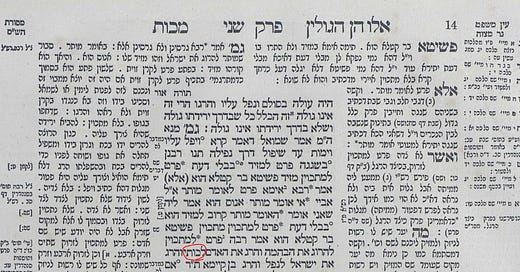Uncouth Cutheans
A contrast between Makkot 7 and Makkot 8. In Makkot 7b, according to the Steinsaltz / Sefaria text:
״בִּבְלִי דַעַת״ – פְּרָט לְמִתְכַּוֵּין. מִתְכַּוֵּין? פְּשִׁיטָא, בַּר קְטָלָא הוּא! אָמַר רַבָּה: פְּרָט לְמִתְכַּוֵּין לַהֲרוֹג אֶת הַבְּהֵמָה וְהָרַג אֶת הָאָדָם, לַגּוֹי וְהָרַג אֶת יִשְׂרָאֵל, לַנֵּפֶל וְהָרַג בֶּן קַיָּימָא.
The baraita states: “Unawares”; to exclude from exile the one who kills with intent. The Gemara asks: With intent? It is obvious that he is not exiled; he is subject to the death penalty. Rabba said: The reference is to exclude the one who acted with the intent to kill an animal and he killed a person inadvertently, or one who acted with the intent to kill a gentile and he killed a Jew, or one who acted with the intent to kill a non-viable newborn and he killed a viable newborn.
However, this seems like an overcorrection to goy. The Vilna text has Kuti:
and this is indeed the work of the censor. It means gentile, where there is a difference in intent of whom he intended to kill, and therefore we might have thought that that difference in intent would suffice to incur exile. A Cuthean would either be entirely identical to a Jew, in which case there should be no disparity; or would be entirely identical to a gentile, in which case why single out a Cuthean.
Artscroll takes its usual approach, and I am not sure if this is deliberate or in ignorance of the sources, So they define the Cutheans and their historical / halachic status in a footnote.
Why do I say the Sefaria text is off? Because all the earlier texts on Hachi Garsinan have nachri. This means essentially the same thing, but maybe there is a slight difference? Maybe it was an earlier censorship stage?
Note there are parallel texts which Rabba is referring to in building on the distinction. A brayta in Bava Kamma 41b, a Mishnah on Bava Kamma 44a, and a Mishnah towards the end of Sanhedrin, 78b. The Mishnah should be most in scope, being proximately closer, especially if Makkot is actually joined to Sanhedrin.
מַתְנִי׳ נִתְכַּוֵּין לַהֲרוֹג אֶת הַבְּהֵמָה, וְהָרַג אֶת הָאָדָם; לַנׇּכְרִי, וְהָרַג אֶת יִשְׂרָאֵל; לַנְּפָלִים, וְהָרַג אֶת בֶּן קַיָּימָא – פָּטוּר.
MISHNA: If one intended to kill an animal, and he killed a person standing adjacent to it, or if he intended to kill a gentile, for whose murder he is not liable to be executed in court, and he killed a Jew, or if he intended to kill non-viable newborns, for whose murder one is not liable, and he killed a viable person, the assailant is exempt from execution, since his intent was to kill one for whose murder he is not liable.
There as well, Vilna has a censored version — oved kochavim, and all the earlier texts have nachri:
So that was the case in Makkot 7b. However, turn the page to Makkot 8b. The Mishnah there states:
מַתְנִי׳ הָאָב גּוֹלֶה עַל יְדֵי הַבֵּן, וְהַבֵּן גּוֹלֶה עַל יְדֵי הָאָב. הַכֹּל גּוֹלִין עַל יְדֵי יִשְׂרָאֵל, וְיִשְׂרָאֵל גּוֹלִין עַל יְדֵיהֶן, חוּץ מִגֵּר תּוֹשָׁב. וְגֵר תּוֹשָׁב אֵינוֹ גּוֹלֶה אֶלָּא עַל יְדֵי גֵּר תּוֹשָׁב.
MISHNA: The father is exiled to a city of refuge due to his unintentional murder of his son. And the son is exiled due to his unintentional murder of his father. Everyone is exiled due to their unintentional murder of a Jew, and a Jew is exiled due to his unintentional murder of any of them, except for the unintentional murder of a gentile who resides in Eretz Yisrael and observes the seven Noahide mitzvot [ger toshav]. And a ger toshav is exiled only due to his unintentional murder of a ger toshav.
In the gemara, clarification of kol.
הַכֹּל גּוֹלִין עַל יְדֵי יִשְׂרָאֵל וְכוּ׳. ״הַכֹּל גּוֹלִין עַל יְדֵי יִשְׂרָאֵל״ לְאֵיתוֹיֵי מַאי? לְאֵיתוֹיֵי עֶבֶד וְכוּתִי. תְּנֵינָא לְהָא דְּתָנוּ רַבָּנַן: עֶבֶד וְכוּתִי גּוֹלֶה וְלוֹקֶה עַל יְדֵי יִשְׂרָאֵל וְיִשְׂרָאֵל גּוֹלֶה וְלוֹקֶה עַל יְדֵי כּוּתִי וְעֶבֶד.
§ The mishna teaches: Everyone is exiled due to their unintentional murder of a Jew, and a Jew is exiled due to his unintentional murder of any of them. The Gemara asks: Everyone is exiled due to their unintentional murder of a Jew: What case that was not already specified does this phrase serve to add? The Gemara answers: It serves to add a Canaanite slave and a Samaritan. The Gemara notes: We learn by inference from this mishna that which the Sages taught explicitly in a baraita: A Canaanite slave and a Samaritan are exiled and flogged due to a Jew, and a Jew is exiled and flogged due to a Samaritan and a Canaanite slave.
Here, Kuti actually does mean Kuti, and Artscroll again gives the historical / halachic background. All the printings and manuscripts indeed have Kuti here.
Why does it matter? Well, a Canaanite slave has semi-Israelite status, being obligated in many mitzvot. The similar case should not be a gentile, but a Samaritan. This would work according to the position / era of the position in which the Samaritans / Cutheans were deemed to be Jewish, true converts. Why is there a distinction, as opposed to either an Israelite or a gentile? Because of the flogged case. As the gemara explains, for being an accidental homicide victim, דְּקַטְלֵיהּ, the perpetrator would of course be exiled. But, for the charmingly similarly identified act of דְּלַטְיֵיהּ, missing the kuf, for cursing, this would not invoke lashes. Why? Because there’s a restriction of ״וְנָשִׂיא בְעַמְּךָ לֹא תָאֹר״ – בְּעוֹשֶׂה מַעֲשֵׂה עַמְּךָ! Since the Samaritans did not keep the Oral Law, they did not do the maaseh ammecha, so this penalty does not apply.
The Vilna’s censorship and Artscroll’s maintaining of it, even in an oblique fashion, is somewhat unfortunate here, because that obscured important distinctions in Makkot 7b and 8b.







